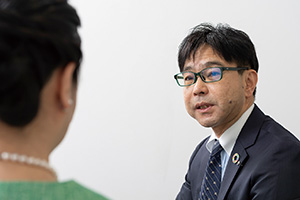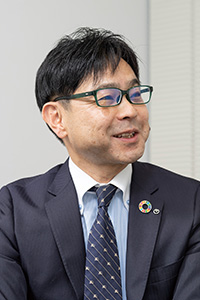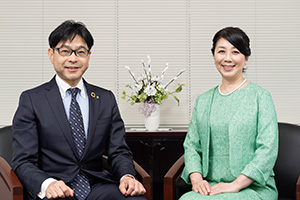Providing a new smart-energy solution for social issues related to the environment and energy
—NTT Anode Energy was established in June 2019. Could you tell us the purpose of establishing an NTT Group company for handling energy business?
The NTT Group is working with partners to solve social issues by promoting digital transformation among its customers by using information and communication technology (ICT) on the basis of its new medium-term management strategy called “Your Value Partner 2025.” In line with this strategy, we are aiming to address social issues related to the environment and energy by providing a new smart-energy solution to complement the existing AC (alternating current) network. This smart-energy solution is composed of information technology, power-supply technology such as direct current (DC) power supplies, central-office resources such as storage batteries, and DC grids that leverage NTT Group’s technologies, know-how, and assets. We provide new value by improving energy efficiency, offering global-warming countermeasures, increasing the use of renewable energy, and enhancing disaster resilience.
To swiftly promote new smart-energy-solution businesses, NTT Anode Energy was established as a strategic company for supervising the energy-related business of the NTT Group, which had been conducted by NTT Facilities, Ennet, and NTT Smile Energy, and has expanded in annual sales to 300 billion yen through cooperation with gas utilities. While continuing to promote this business, we are fostering business creation by using people, technology, and assets as well as bolstering smart-energy business for medium to long-term business growth. We are aiming to double the sales volume of energy-related business by NTT Anode Energy and its group companies Ennet and NTT Smile Energy to 600 billion yen by FY 2025.
—What are your specific areas?
In November 2019, we announced the NTT Anode Energy Medium-Term Vision for creating a new energy-distribution system and contributing to creating a sustainable society. This vision states that NTT Anode Energy has three roles: (1) customer-value creation, i.e., building a connected value chain by providing solutions using distributed energy resources such as renewable energy and storage batteries, invigorating industries by improving the efficiency of energy use and increasing environmental value; (2) strengthening social infrastructure, i.e., constructing new distributed systems that enable sophisticated use of energy through autonomous and optimal control using ICT and data, providing stable energy in a resilient manner to local communities by complementing existing power-supply systems; and (3) environmental adaptation, i.e., creating an energy-recycling society by securing energy centered on renewable energy and maximizing its use as a locally produced locally consumable power source with high environmental value.
Taking on these roles, we are expanding the following five businesses: (i) backup power supply, i.e., transforming multiple businesses into a community and strengthening local resilience; (ii) virtual power plant (VPP), i.e., aggregating energy resources and adjusting demand according to supply conditions; (iii) green power generation, i.e., creating environmental value (including local production for local consumption of power sources); (iv) electricity retail, i.e., providing energy with environmental value; and (v) new services, i.e., providing an energy-data platform that integrates energy with ICT and local industry (agriculture, etc.).
Specifically, we will start services to provide solar power and batteries on customers’ premises that can be used as backup power in emergencies to public and critical institutions such as municipalities and medical institutions. We are also investigating providing emergency-power services using electric vehicles owned by the NTT Group in line with the “EV100” initiative that the Group is working on as well as applying the Innovative Optical and Wireless Network (IOWN) to the energy field in the future. Installing sensors, cameras, 5G (fifth-generation mobile communication systems), etc. in cities will enable us to comprehend information on energy use in those cities in the digital world. When a power outage occurs, it will be possible to digitally check information on where the people and facilities that actually need electricity are, instantly simulate how much energy is needed to support such people and facilities, and what to do to cover that energy demand by using IOWN, including artificial intelligence, and give feedback to the real world. Thus far, countermeasures have been taken after investigating damage due to disasters or accidents; however, IOWN makes it possible to immediately comprehend the necessary actions and energy allocation to minimize the effect of power outages. Accordingly, I believe it is necessary to diffuse new energy resources, such as storage batteries and solar power, throughout society. On top of that, in cooperation with Ennet and NTT Smile Energy, in anticipation of the further spread of electric vehicles, we are conducting demonstration experiments in several regions of Japan, such as on managing the charging of electric vehicles and using them as power sources.

If you create your own scenario, make it a reality according to your convictions
—What kind of competence and responsibilities were required when launching the company?
The energy business we support is characterized by an extremely long timeframe. A large renewable-energy project requires ten years and even a small one requires a few years. The world is changing so fast that it is difficult to foresee the world 10 to 20 years from now. On the other hand, if we don’t decide on such a project now, we won’t get the energy that we envision in 10 years. Therefore, even in very uncertain situations, we need to make quick decisions so that we can fulfill our role promptly. I think that such decision making is required of me—which is a huge responsibility.
Moreover, to make these actions worthwhile, I think it is important to watch social trends, imagine the future, and build one’s own scenario, even though one cannot be completely certain. Then, when moving towards making that scenario a reality, ask yourself what should be valued and make decisions according to your convictions.
Regarding environmental issues, at the United Nations Climate Action Summit 2019, 16-year-old Swedish schoolgirl Greta Thunberg said, “You have stolen my childhood dreams with your empty words.” In response to such pressure, future measures to prevent global warming include various options: simply introduce renewable energy, create new methods of curtailing CO2 in a different way as a result of the emergence of a new means of energy distribution, or reduce CO2 by reducing energy consumption in the first place. This issue is closely related to our company, and I believe it is important to take actions believing that one of these options is the best.
—How do you find the knowledge for making a decision?
What I value is how I can create as many communication channels as possible with people from different types of business. I think people tend to avoid communication in uncomfortable environments and unfamiliar fields, so they often participate in gatherings directly related to their businesses and industries. However, the fact that the world changes means that the values and common perceptions of society will also change. Therefore, instead of staying in the same place, we should dare to step into places that are not directly related to our type of business and obtain information from those places. However, time is limited, so the scope of these activities is also limited. To expand my horizons as much as possible, I have made an effort to not only jump into other worlds but also create non-profit circles and attract people with a sense of purpose. I’m managing a circle in which highly motivated people can gather—regardless of nationality or industry—to exchange valuable information.
Through these activities, I met an American who once said to me, “No pain, no gain.” I say this to myself when I hit a wall or get a little down. This phrase resonated deeply in my heart perhaps because of the situation I faced then.

Get advice to “jump into the ring of the opponent”
—Will communication in uncomfortable environments and unfamiliar fields lead to great opportunities?
Not exactly an opportunity, but I’ve had the experience of asking for others’ opinions even when I can solve a problem myself. At a meeting held abroad, I became acquainted with a person in a completely different industry. I asked him that I’m thinking about such and such and what did he think. He thought hard and gave me advice. With that advice, I was able to establish a business model here in Japan that was good enough to be taken up by the mass media. Rather than arguing about ideas and opinions in discussions, I could get advice by gaining trust and asking questions.
—Through these experiences, what do you think the role of senior management is?
I feel that I have grown through my work and hope to grow further in step with the growth of the company. In that sense, work is a place where we can enhance ourselves, and that is a great way to contribute to society. Regarding being in senior management, I believe that each person has an appropriate role assigned to them that suits society, the time, and environment. It’s a matter of finding the right role you should play in the environment that you are in, always being conscious, and persistently striving to fulfill your assigned role.
From now onwards, NTT Anode Energy will expand its activities in the invisible but essential world of energy. Electricity in Japan has been supplied very stably. Power outages in Japan are rare compared to other countries, and people have the common notion that electricity can be used at any time. However, inconvenience concerning electricity was exposed by recent environmental problems and disasters that occurred in various parts of Japan. Under these circumstances, the NTT Group is working to create a society in which people can feel the improvement of convenience through energy use and use energy appropriately with peace of mind.

Keeping an eye on changes in public sentiment and opinion
—Please give a few words to engineers and researchers.
As I used to be, people tend to be biased toward creating networks in the same business category. As the development of new technologies, such as IOWN and quantum computing, advances, the era in which the Fourth Industrial Revolution will come to fruition is imminent. Society can change in a completely different way than before, and current social perceptions and values can also change. To survive this transformation period, we must pay close attention to not only actions and perspectives based on values and economic rationality that simply extend previous thinking but also diversity, public sentiment and opinion. I have a sense of urgency that if we don’t act while thinking ahead, we may not survive. At the same time, business and game-changing opportunities may arise in various places. From this viewpoint, to strengthen the basic skills for taking on various initiatives, I recommend networking and information exchange with people in a variety of businesses and industries that may seem irrelevant and taking actions that broaden your ideas. It’s really difficult to communicate in an environment in which you are not good at. However, I think that some of the information and ideas that can be obtained will become beneficial. Therefore, to produce new technologies and outstanding results in response to changes, I’d like you to, by all means, actively step into new areas, relationships, and places.
